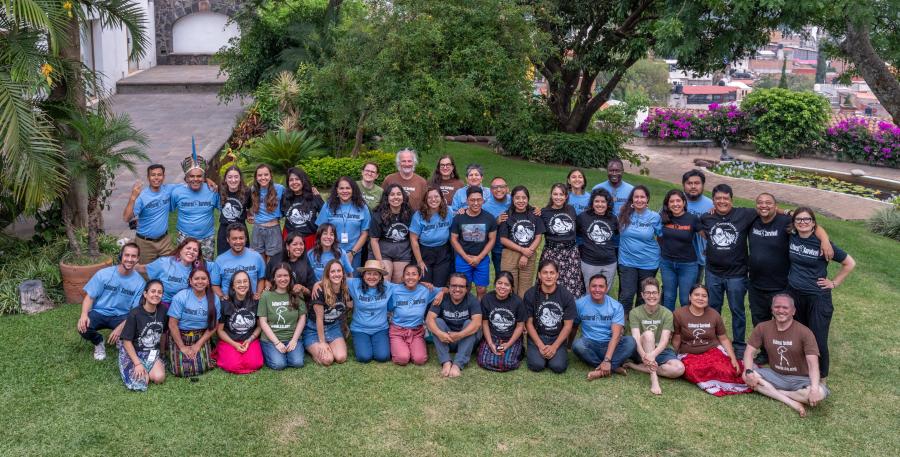Indigenous peoples have for centuries suffered at the hands of those who conquered their territories. No that colonialism is in disrepute and the major world empires are in dissolution, it is tempting to think that those suffering were regrettable aspects of a bygone are; but the descendants of those who suffered still carry with them a vivid recollection of what happened all too recently, and what might happen again. That is why they tend to be suspicious of programs affecting them that are conceived in the modernized (and recently colonialist) countries of this world.
Those suspicious have reemerged in discussions concerning the Human Genome Diversity Project, which is discussed in this issue, but they are not the only reason for the passion that has infected the debate. Many people are excited by recent advances in molecular genetics and biomedical research, which could bring enormous benefits to humankind. At the same time, many people are deeply concerned by the ethical and religious problems raised by new medical possibilities. Organ transplants are a case in point. The fact that a recently dead person's organs can be transplanted to give another human being a new lease on life is literally wonderful, but will this lad to a market or, worse still, a black market in human organs? Is there a risk that people might actually be done to death in order to supply organs for others? Dark rumors are already circulating to this effect in some parts of the world.
The Human Genome Diversity Project has touched on similar anxieties because of its coincidental connection with the practice of gene patenting. As various contributors to this issue explain, the patenting of DNA sequences is undertaken in order to make it commercially possible to use them to produce medicinal products. Critics point out that it is inappropriate and unacceptable to take out a patent on (and therefore in some sense to "own") the basic genetic materials of someone else's life. Indeed RAFI (The Rural Advancement Foundation International) has campaigned against all forms of "life patenting", covering seeds and non-humans as well as human genetic strains. There appears to be considerable agreement among the contributors to this issue, whether they support or attack the HGDP, that the present system under which cell lines have to be patented in order to be made useful medically is a bad one and should be changed. The problem is that changing it would require not only a rethinking of the capitalist system of financing new medical treatments but also an international agreement on a worldwide system to replace to present one. These are admirable goals but they are clearly not going to be achieved very quickly, which leaves us all with the problem of what to do in the mean time.
Another line of criticism voiced by some indigenous spokes-people is that they consider their land, the life forms on it and all aspects of their own persons - such as blood, hair and tissue, as well as DNA samples - to be sacred. They cannot therefore be "owned, and certainly not by other people. Many non-indigenous people share their objection to private and commercial "ownership" of such item and battles over private versus communal ownership of land have raged between colonists and colonised ever since the beginnings of imperialist expansionism. But, leaving aside the special issue of patents and "ownership", would this mean that those indigenous peoples who hold these views (and not all do) would refuse to give physical samples for medical tests?
Similarly, if their agricultural traditions are sacred, does that mean that they cannot be changed, even in the face of new circumstances and new population pressures? If so, they might have to do without those "western" therapies that rely on the taking of physical samples and they might be deprived of the possibility of modernizing their own practices even according to their own lights. These dilemmas have not yet been fully discussed by those who invoke the broader aspects of sacredness in their lives and traditions.
The heart of the issue posed by the HGDP is a mutual misunderstanding. The scientists advocating the program know that it does not target indigenous peoples. It does, however (and must if it is to accomplish its objectives), aim to be comprehensive, taking samples from a large majority of the world's populations. The benefit of doing this would not only be an increase in our knowledge of the histories and interrelationships of human populations, but also the development of new treatments for diseases which cannot at present be treated effectively. Some of those same scientists have been stunned by the adverse reaction, particularly from indigenous people, to what they see as a benign program. What they failed to take into account are certain considerations that lie outside the scientific rationale. Indigenous peoples are often tired of being studied and are understandably reluctant to be the objects of research programs conceived in "the west". Many of them are reluctant to undergo the personal invasion involved in giving genetic samples and most of them are outraged by the notion that such samples may be patented.
The solutions for what might otherwise seem to be an impasse are suggested by some of the papers in this issue. Develop a different way of handing genetic strains other than patenting them. Make an international effort to explain the program and to elicit the cooperation of indigenous peoples with it. The solutions are unfortunately both expensive and time consuming, but if they could be put into effect they would achieve a social as well as a biomedical breakthrough, for they would institutionalize collaboration rather than confrontation between indigenous peoples and the practitioners of a science that it no longer suspected of being used against them. Article copyright Cultural Survival, Inc.


